Together We Shine Brighter: A Teacher’s Insights from #Aurora23
CompetencyWorks Blog
At the Aurora Institute Symposium 2023, we piloted Networking Groups for a few different topics and affinity groups to support connection and community building. An inaugural crew of Networking and Storytelling Stewards, including Dylan from Westminster Public Schools, guided the groups. We invited each steward to write a blog post with their reflections to continue the reach of #Aurora23.
As teachers, we are so used to working in the isolated ecosystem of our classrooms. In fact, we’re so used to being the “sun” of the ecosystem – and I don’t mean that people and things rotate around us. In fact, in a competency-based education (CBE) classroom, it is the exact opposite. What I do mean is that we are the place where energy often originates and we then pass that energy into the units of study, in co-designing projects and assessments, into the data analysis, and, most importantly, into our students. But unlike the sun, there are times when our energy begins to wane a little, which in return, can make the ecosystems of our classrooms work a little slower and a little less effectively…and we all know that those are the moments when our students need the most energy from us.
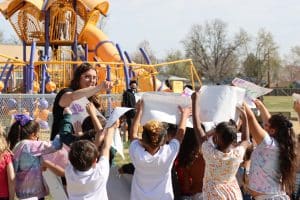
Fortunately, unlike the sun, we live in a society where we are able to connect with other educators and professionals who know that feeling of depletion all too well. At the beginning of October, I was experiencing that feeling for the first time this school year. The newness of the year was gone, my classroom had lost its “first-week sheen,” and I was feeling stuck in the ever-turning wheel of running out of time and simultaneously not doing enough each day.
Lucky for me, I got to travel to Palm Springs where the fire of my sun was rekindled at #Aurora23. As I connected with like-minded people from around the globe, I was reminded that, in fact, we aren’t just the sun of our own personal ecosystems, but rather we’re a part of a universe of system leaders, changers, and innovators. We can’t do this alone! After reflecting on my time at #Aurora23 and the conversations I had with many incredible individuals, I can confidently say that the network of people at #Aurora23 is who you need in your orbit.
1. Fellow Suns (Fellow Teachers)
Your fellow teachers are the only people who truly know what you are going through right at this moment. Even those who taught in the past don’t have the same experience that you do of teaching today. I was so lucky to be able to attend a session led by a group of elementary school teachers – two from New York City and one from Massachusetts. During their session, I learned how, similarly to my school district, teachers worked to write the competencies for their schools. Yet, their competencies were different from the academic ones I use each day – the competencies they used were inspired by work habits and collaboration skills. This helped expand my worldview and made me think of the different ways that I could also begin to use work habits in my classroom.
After their session, we were able to connect and discuss the celebrations and challenges we face as teachers working in an innovative system. We shared how we gave students voice and choice in our classroom; we shared resources that we’ve used that were successful (and others that weren’t so successful…). I walked away from the conversation feeling heard and understood. I am lucky to have amazing colleagues who support me day in and day out, but to know that there were teachers across the country who are “fighting the good fight” each day made the education world feel a little smaller and a little more connected. I am grateful for the connections I made with fellow teachers during my time at #Aurora23 and I’m even more grateful to get to continue to grow those relationships as I continue my teaching journey.
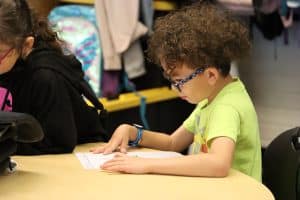
2. A Strong Gravitational Force (Strong Leadership)
My principal, Claudette Trujillo, is an incredible force of nature. She is bold, intelligent, and courageous. I’ve always known that she is a changemaker. During my time at #Aurora23 I got to witness her present alongside Rebecca Midles, Erin Whalen, Dr. Shameka Gerald, and Dr. Keeanna Warren. As a result of this session, my admiration for her grew even more. I got to hear her speak of her journey in competency-based education from the ground up – she was one of the trailblazers when our district dove head first into implementing a competency-based system 14 years ago. I got to watch her live out the tenet of “continuous improvement” as she honestly shared about mistakes and struggles she experienced as a teacher, coach, and administrator – and then also hear how she bravely overcame these moments.
At that moment I truly realized how essential it is to have a principal whose strong gravitational pull keeps you grounded and on your feet. Every teacher deserves to have a Claudette who trusts them whole-heartedly to do their job, while also challenging them and continuously working with them to create goals that improve their practice. Just like the force of gravity keeps our feet on Earth, a principal who keeps you grounded and focused is essential.
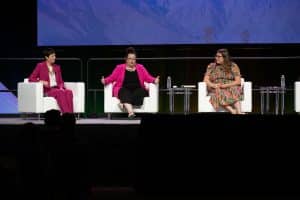
3. Astronauts (Policy Changers and Coaches)
One of the gifts of #Aurora23 that I will never take for granted is access to the astronauts. These are the people who get to fly from planet to planet (school to school or district to district) and experience constant magic. They are the people who put in the time and research to discover new best practices. They are the people who have the ability to look closely at the details to figure out what does and doesn’t work (without the interruption of a student who needs you to tie their shoe or the copier jamming). They are the people who can push the envelope and create systemic change because they get to experience and meet so many.
My favorite thing about these people is that as they travel, they pick up souvenirs (nuggets of information and experience) that they then share with the individuals on the next planet – and then those individuals get to experience the impact of that shared wisdom and experience. Although I had met him one time prior, I was so excited to connect with Nik Namba from Transcend. I learned about the research that his team has been conducting around student agency in K-2 classrooms around the country. Although I teach level 5, I walked away from my conversation with Nik completely floored and bubbling with ideas that I immediately brought back to try in my classroom. (We’re still in the process of trying them right now!) Every teacher, school, and district who is implementing CBE needs to leverage the expertise that coaches, consultants, and policy makers bring to the table as they travel throughout the galaxy.
4. Stars (The Kids)
And finally, we’ve reached the most important people in the orbit of a teacher. While our sunshine might initially energize, it’s the stars who take that energy and mold it into something truly spectacular. (And for the astronomers out there, I know the sun is a star and doesn’t energize other stars, but I hope you can still follow along with the spirit of the metaphor!) It can be challenging to be a teacher, but at the end of the day, please keep kids at the center of all you do. I left #Aurora23 as a different teacher after hearing from the student presenters.
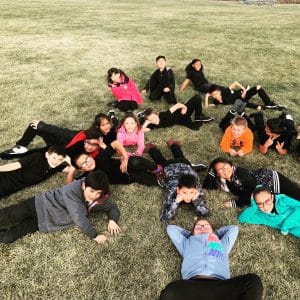
Students involved in the District of Columbia Public Schools Design Lab used the power of their voice to make systemic changes in their schools. Now I am trying to elevate my students’ voices and listen a lot harder and a lot better. Hearing the incredible students of the Lifting Up Student Voices for the Future of Learning panel and how the experiential learning that they designed alongside the educators in their building energized their personal learning journeys motivated me to take more time to sit down with all 29 of my students to create personalized projects that will take their learning to the next level. The kids in our classroom are strong, unique, brightly shining stars who deserve every bit of energy and light that we can muster. They are the most important people in our orbit.
I know I am so lucky to have had the opportunity to attend #Aurora23, and even more lucky to have been able to meet so many educators who have now joined my orbit. Teachers – when things get challenging and your energy begins to fade, please remember to reach out to those in your orbit and let them help you grow your light. If you need someone to join your orbit, know you can always reach out to me because if there is one thing I learned during my time at #Aurora23, it is that there is no way you can do this alone.
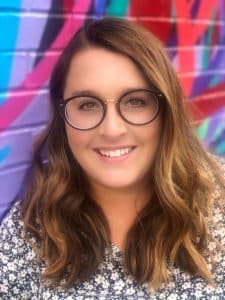 Dylan Shelofsky is a passionate educator with teaching and learning ingrained in her DNA. Coming from a lineage of educators, she always knew she would become a teacher. Currently at Metropolitan Arts Academy in Westminster Public Schools, Colorado, Dylan teaches levels 5 and 6, advanced theater, and directs the musical. She previously taught both primary and intermediate levels. She holds a Bachelor of Fine Arts in musical theater from Stephens College and a Master’s in Elementary Arts Integrated Inclusive Education from Columbia University in NYC. Dylan’s commitment to education goes beyond her classroom to include presenting at various conferences, including the Westminster Public Schools Competency-Based Education Summit, Assessment for Learning Conference, and Aurora Symposium 2022. She actively contributes to her district by helping revise and write proficiency scales and serving on committees for data and assessment, as well as gifted and talented programs and the Superintendent’s Teacher-Leadership Cabinet.
Dylan Shelofsky is a passionate educator with teaching and learning ingrained in her DNA. Coming from a lineage of educators, she always knew she would become a teacher. Currently at Metropolitan Arts Academy in Westminster Public Schools, Colorado, Dylan teaches levels 5 and 6, advanced theater, and directs the musical. She previously taught both primary and intermediate levels. She holds a Bachelor of Fine Arts in musical theater from Stephens College and a Master’s in Elementary Arts Integrated Inclusive Education from Columbia University in NYC. Dylan’s commitment to education goes beyond her classroom to include presenting at various conferences, including the Westminster Public Schools Competency-Based Education Summit, Assessment for Learning Conference, and Aurora Symposium 2022. She actively contributes to her district by helping revise and write proficiency scales and serving on committees for data and assessment, as well as gifted and talented programs and the Superintendent’s Teacher-Leadership Cabinet.